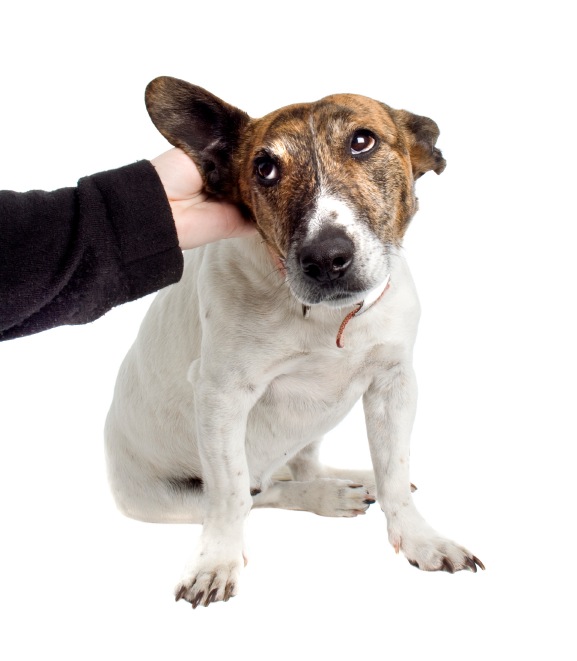 There are different types of Dog Allergies and the most common type is the inhalant allergy, also referred to as allergic inhalant dermatitis (atopy, hay fever), which is caused by substances in the air that dogs breathe in. Just like humans, dogs can be allergic to pollens, molds and household dust. When you consider that your dog has its nose on the ground most of the time, and is continually sniffing throughout the day, you can imagine the outcome with an allergic dog. Inhalant allergies commonly cause skin problems in dogs. While the reactions in humans are inflamed respiratory passages and sneezing, dogs inhale the pollen and develop atopy in the skin. A dog usually doesn’t sneeze, but becomes an itchy dog that licks, chews and scratches.
There are different types of Dog Allergies and the most common type is the inhalant allergy, also referred to as allergic inhalant dermatitis (atopy, hay fever), which is caused by substances in the air that dogs breathe in. Just like humans, dogs can be allergic to pollens, molds and household dust. When you consider that your dog has its nose on the ground most of the time, and is continually sniffing throughout the day, you can imagine the outcome with an allergic dog. Inhalant allergies commonly cause skin problems in dogs. While the reactions in humans are inflamed respiratory passages and sneezing, dogs inhale the pollen and develop atopy in the skin. A dog usually doesn’t sneeze, but becomes an itchy dog that licks, chews and scratches.
There are differences between the different types of allergies. What is unique with inhalant allergy (hay fever), is the fact that it is more common in some breeds than others and tends to “run in families”, meaning that it is mostly genetic. Breeds with particularly high incidence of allergies include terriers (especially the West Highland Terrier, Skye Terrier, Scottish Terrier, and Boston Terrier), Golden Retrievers, Poodles, Dalmatians, German Shepherd Dogs, Chinese Char-peis, Bichons Frises, Shih Tzus, Lhasa Apsos, Pugs, Irish Setters, and Miniature Schnauzers. Any dog however, purebred or mutt, may be affected by inhalant allergies.
Dogs with inhalant allergies usually first begin to show signs between 6 months and 3 years of age, although a dog of any age can develop allergies. The most common sign of allergic itching is chewing at the feet, and the constant licking may stain the hair coat a rusty color. Other itchy areas include the flanks, groin and armpits. Many dogs rub their faces on the carpet, furniture, or other convenient surfaces. Dogs can do incredible damage to themselves by scratching and biting.
The ears are also involved in many cases and the flaps may become reddened and hot. When the skin becomes inflamed, infection is sure to follow, and many allergic dogs develop chronic ear infections or skin infections. The skin also becomes thickened, greasy, and smelly. Self-traumatized areas may develop recurrent bacterial infections which are referred to as hot spots on dogs. If dogs are allergic to pollens, they may have these problems only part of the year, but if they are allergic to house dust or molds, they will probably have problems year-round. To complicate matters further, about 50% of dogs that start out with seasonal allergies, eventually have problems all year. Also, most dogs that have a tendency to develop allergies usually develop several. Therefore, a typical allergic dog may have problems with a variety of different pollens, mold, house dust.
Since in most cases inhalant allergies are genetic and cannot be cured, it is important to try and avoid allergens because itchiness and scratching won’t occur unless allergens trigger an allergic reaction.
15 Tips To Help Avoid Allergens:
- Minimize outdoor time for your dog, especially during his allergic season, if you notice that he is extremely itchy shortly after going outside and walking in the yard.
- Keep your dog indoors just after watering the yards, or just after cutting the grass, when allergens are active.
- Consider putting booties or a T-Shirt on a severely allergic dog when he goes outside, and remove and wash the items after he comes inside.
- You can also wash off his feet with a wet washcloth to remove some of the allergens and thus reduce his contact after he has been outdoors.
- Frequently vacuuming and shampooing carpets reduces the foreign proteins that live deep in the carpet fibers.
- Keeping all areas of your house clean of dust helps as well. Window treatments, pillows, and upholstered furniture can trap allergens just as carpets do.
- If your dog spends time in your car, you need to keep the carpet and upholstery there clean as well.
- Be especially vigilant about your dog’s bedding. Change and clean bedding frequently to decrease the allergenic load. The most common allergen on bedding is house dust mites. Frequent washing decreases the presence of this highly allergenic mite.
- To keep your indoor air free of allergens, change the air filters on your heating and air conditioning systems regularly. These filters trap the allergens, but if left in place too long, they will simply push the allergens back into the air. Preferably use electrostatic or “allergy-free” air filters. High-efficiency particle-arresting (HEPA) filters can be attached to central air conditioning systems and are recommended for people and pets with allergies.
- Cigarette smoke often acts as an allergen trigger in both people and pets. To keep your dog healthy and itch free, keep his environment smoke free.
- One of the quickest ways to comfort an allergic dog is with a cool bath. The effect doesn’t last long, but it does help relieve itchiness in dogs. Be sure the bath water is cool rather than hot, since hot water can actually make the itchiness worse.
- Preferably use a natural calming and soothing dog shampoo to provide additional relief.
- Many allergic dogs have surface infections on their skin or in their ears, and these infections are also itchy. Use a natural anti-itch spray with a cooling effect and one that kills bacteria, fungi, and viruses. A spray easily penetrates fur to get to the skin, is great for areas that are sensitive to touch, and can be sprayed directly into the ears.
- A natural anti-itch gel with a cooling effect and one that kills bacteria, fungi, and viruses can be applied to hairless areas such as abdomen, armpits, muzzle paws, the inside of ears and ear flaps, and hot spots on dogs.
- Nutritional dog supplements can also be helpful in the treatment of inhalant allergies, especially one with natural anti-inflammatory agents will help reduce the itching by decreasing the inflammation in the skin. A nutritional dog supplement that acts as a natural detoxifierr will help rid the dog’s body of toxic substances that often cause the itching.
Resources: Guide to Skin & Haircoat Problems by Lowell Ackerman, D.V.M. The Allergy Solution for Dogs (The Natural Vet Series) by Shawn Messonnier, D.V.M
Information Disclaimer: Information provided on the Olewo Blog is intended for informational purposes only. This site does not provide medical advice, and is not meant to substitute for medical advice provided by your veterinarian.


kerry Forrest says
What specific products do you recommend. My Bichon Frise suffers from seasonal allergies. I always thought they were topical not inhaled.
olewousa says
We have 2 natural products that help with seasonal allergies. Olewo Red Beet Dog Food Supplement – it strengthens the immune system, naturally detoxifies, and has anti-inflammatory properties. PineFauna Skin & Coat Care Spray calms and soothes dogs with a cooling effect to stop the itching. Because they work so well together we are offering the combo at a special price. Yes, seasonal allergies are inhaled. Contact allergies are not as common because dogs have a fairly dense hair coat, and the allergen must actually contact the skin (not jut the hair coat) to cause a problem.
mobile dog wash adelaide says
A work mate recommended me to this website.
Thank you for the information.
Abby Burney says
I’m amazed, I must say. Seldom do I encounter a blog that’s both equally educative and interesting. The issue is an issue that too few people are speaking intelligently about. Now i’m very happy I came across this in my search regarding this topic.
Margaret Bledsoe says
I am actually thankful to the owner of this site who has shared this wonderful post at this
place.
Alta says
I actually seem to agree with everything that is written inside “15 Tips
to Help Reduce Inhalant Allergies in Dogs”. Thanks a lot for all the actual information. Alta